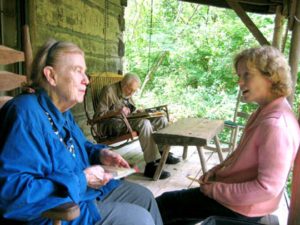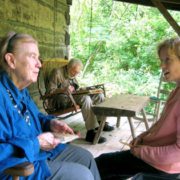VOICE NOTES: A FOLK DIVA’S GUIDE TO THE GALAXY Number 12
The Art of the Unaccompanied Voice ~ A capella Voice Course

Number 12, October 1, 2021
The Art of the Unaccompanied Voice #1
In my career, I’ve had the incredible opportunity to learn from one of America’s greatest folk musicians; composer, performer, author and scholar, Jean Ritchie was my friend. I was so fortunate to get to know her as mentor, teacher, guide and inspiration.
The wealth of scholarship around Jean and her own incredible career as an artist is vast. I’m going to touch on one aspect of her work that affected me profoundly as a singer, and that was the skill of acapella ballad singing. There are certain challenges around this skill, mechanical and artistic. I’ll be briefly touching on both aspects in this two-part blog post.
In this first part, we talk about mechanics. If you’ve read my prior blogs on breathing for the singer, you know that breath management is an important skill for all singers to have. Your awareness of how you breathe I call “intentional breathing.” This means that you know where in the song you’re breathing, how the breath effects the phrasing, and how to breathe well. In fact, think of breathing this way:
All tone rides on a column of air. When you take in breath, send the air down into the lower half of the lungs, using the mechanics of diaphragmatic breathing. This process fills the lower portion of the lungs and provides you with good air support through the line of a lyric. Secondly, keep your body relaxed, your jaw loose and throat open as you sing, granting access to the resonating chambers behind your nasal cavity and throat. Keep your shoulders still and upper body relaxed and quiet. Let the abdomen expand and retract as you take in air and use it to sing.
Pitch. In acapella singing your pitch must retain accuracy in keeping to the key of the song. When you practice keep a pitch pipe or instrument close by and occasionally check whether you’ve strayed from the key of the song. Are you still in C (for example)? You can also record yourself singing to check this, to see if you tend to stray, either below or above the key as you move through the song. Resolve to keep your ears open, listen and keep good pitch.
Word rhythm is open to your interpretation and can be very fluid in acapella singing. As we speak, our sentences are full of rhythm, and this is true for acapella singing. Since you’re not keeping with an instrument or other singers, this can be as fluid as you want, or as you feel at the time. Experiment with what makes sense to you. In singing acapella, you are in charge and it’s your individual expression – you’re communicating your feelings. That’s why acapella singing can be so individual and unique to you.
So now you have breath, pitch, word rhythm. What is phrasing? A phrase is technically a unit of meaning. It’s like a sentence with one object. Typically, a phrase should be sung on one breath in order to knit together the words to form a sentence-like structure. Think of how you want to interpret the song, and that will affect how you phrase the lyrics. Imagine you’re telling the story to someone and have that person clearly in mind. This will create a more vivid sense of communication.
In part two, I’ll discuss the art of “decoration,” grace notes, melody alterations, the difference between influence and imitation, and personal connection to your songs.
And from the source ~
“No one person is the expert on how traditional songs should be sung – there are as many different ways as there are trad singers. The thing is that some trad singers’ styles and sound have endured more than others – a matter of a wider (mass) appeal which endears these few to the bigger audience…for me it is true also, that the trad singers with the lower and even least mass appeal are just as important as those who become well-known and/or famous.” Jean Ritchie
See you next time!
Blessings and love,
Susie
________________________________________________
Award-winning recording artist, Broadway singer, journalist, educator and critically-acclaimed powerhouse vocalist, Susie Glaze has been called “one of the most beautiful voices in bluegrass and folk music today” by Roz Larman of KPFK’s Folk Scene. LA Weekly voted her ensemble Best New Folk in their Best of LA Weekly for 2019, calling Susie “an incomparable vocalist.” “A flat out superb vocalist… Glaze delivers warm, amber-toned vocals that explore the psychic depth of a lyric with deft acuity and technical perfection.” As an educator, Susie has lectured at USC Thornton School of Music and Cal State Northridge on “Balladry to Bluegrass,” illuminating the historical path of ancient folk forms in the United Kingdom to the United States via immigration into the mountains of Appalachia. Susie has taught workshops since 2018 at California music camps RiverTunes and Vocáli Voice Camp. She is a current specialist in performance and historian on the work of American folk music icon, Jean Ritchie. Susie now offers private voice coaching online via the Zoom platform. www.susieglaze.com
Quick Announcement: I’m opening my voice studio to new students, so if you’re interested in studying singing, check out my teaching HERE Then get in touch! Email me HERE
VOICE NOTES: A FOLK DIVA’S GUIDE TO THE GALAXY Number 12
The Art of the Unaccompanied Voice ~ A capella Voice Course













